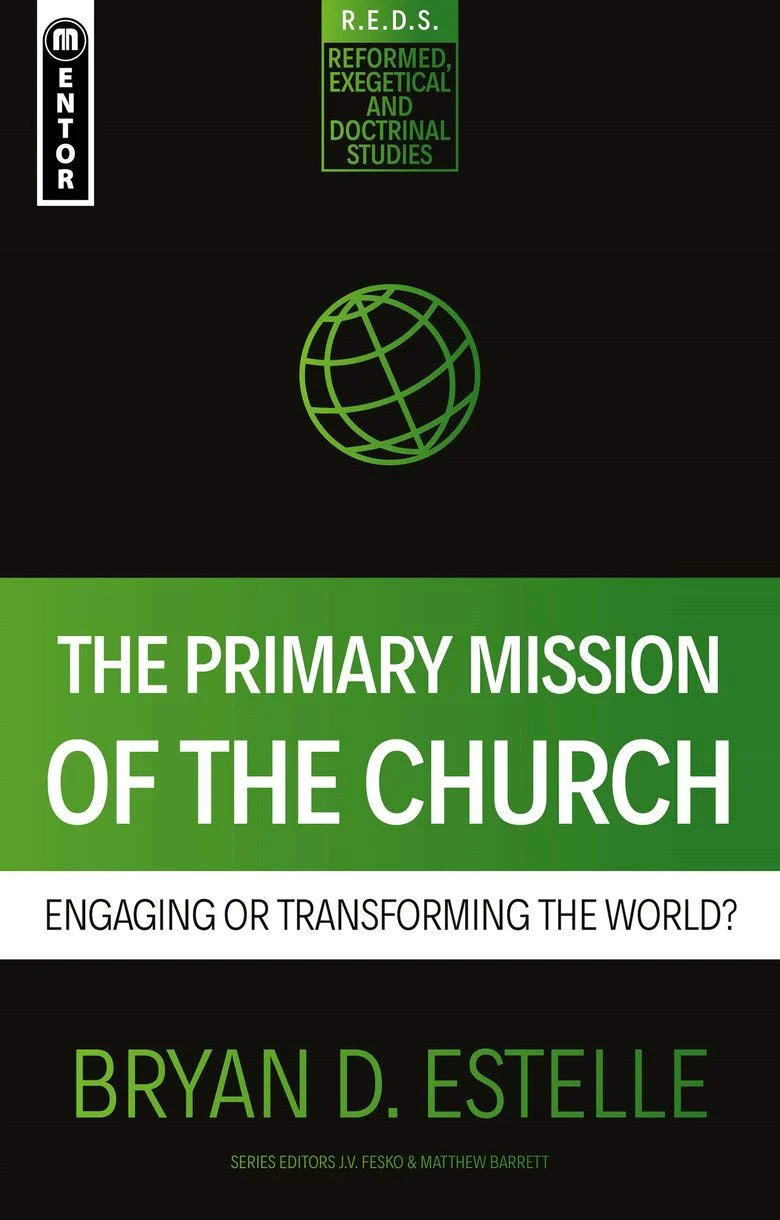
Bryan D. Estelle
Reviewed by: Jonathan L. Cruse
The Primary Mission of the Church: Engaging or Transforming the World? by Bryan D. Estelle. Mentor, 2022. Paperback, 448 pages, $19.99. Reviewed by OP pastor Jonathan L. Cruse.
A discussion on the mission of the church could not be timelier. In recent years, identity politics, election controversies, global pandemics, race riots, and economic instability—to list just a few of the societal ills currently plaguing the world—have all forced Christians to ask the question, “How should the church respond?” Thoughtful discussion and discourse on the nature and mission of the church is always welcome, especially if it sharpens our resolve to do those things for which we are called, and to that end Bryan Estelle’s new book, The Primary Mission of the Church, is a welcome resource.
Estelle, an OP minister and professor, takes up the doctrine of the spirituality of the church (SOTC), though he prefers to use the terminology of the church’s mission. I found this to be a helpful corrective to the counterclaim that the doctrine of SOTC makes the church impotent and irrelevant. Nothing could be further from the truth. The church does indeed have power, a power that is derived from Christ as the Head of the church (350–377), and a power that “is very specifically delineated in the Bible” (123).
The question, then, is not does the church have power, but rather, what does the church have the power to do? Estelle echoes the claim of Machen that “the responsibility of the church in the new age is the same as its responsibility in every age”—namely, to preach the whole counsel of God. As Estelle goes on to unpack, “ministers in their pulpits only have declarative authority, that is they may only be ambassadors of Christ and declare what he has authorized them to say, nothing more and nothing less” (27). This in no way immobilizes or disempowers the church, for even if it seems foolish to the world (and sadly, sometimes to the church, too) it is through preaching that God saves those who believe (1 Cor. 21). Nor does it mean that we should not care about effecting change in the world for the good of neighbor and the glory of God. But, as Estelle asserts, this is “the duty of individual Christian citizens to influence change within the culture that they find themselves in” (254).
The book roots itself in the historical discussion of the nature of the church up to this point, primarily by uncovering Presbyterian and Reformed treatments of the subject. Estelle exposes the reader to the ecclesiological thoughts of men like Calvin, Hodge, Roberts, Bannerman, Thornwell, and others, and denominational controversies over the decades and their key players. While taking care to trace the historical path leading up to the twenty-first century, he also engages with contemporary thinkers on the subject. Most significantly, a work by Sean Lucas and decisions by a recent PCA general assembly are noted as being impetuses for writing this book (34).
Estelle’s significant contribution to this important subject is approaching it from a biblical-theological lens. We are treated to his in-depth and expert handling of Old Testament texts in particular, helping us to think about these ecclesiastical issues in a new way (chs. 2–4). For example, who knew that the story of Joseph could teach us so much about the mission of the church? Similar exegesis of Daniel was a delight, and the key texts from Matthew’s gospel regarding Christ and the church were helpfully unpacked.
The depth of scholarship that Estelle brings to this subject—exegetically, historically, confessionally, and theologically—may prove a challenge to some readers. This is probably not the first book you want to pick up if you are new to the subject of ecclesiology or SOTC specifically. But the payoff is well worth it. Readers will be better equipped to approach the current social issues of the day in a biblically informed manner. And preachers and pastors, like me, will be freed, emboldened, and compelled to fulfill their calling of preaching the gospel, “which is the power of God for salvation” (Rom. 1:16).
November 09, 2025
November 02, 2025
October 26, 2025
October 19, 2025
October 05, 2025
Raising Sexually Faithful Kids and
Parenting Boys and Girls in a Gender-Confused World
September 28, 2025
Calvin’s Ecclesiology: A Study in the History of Doctrine
September 21, 2025
© 2025 The Orthodox Presbyterian Church